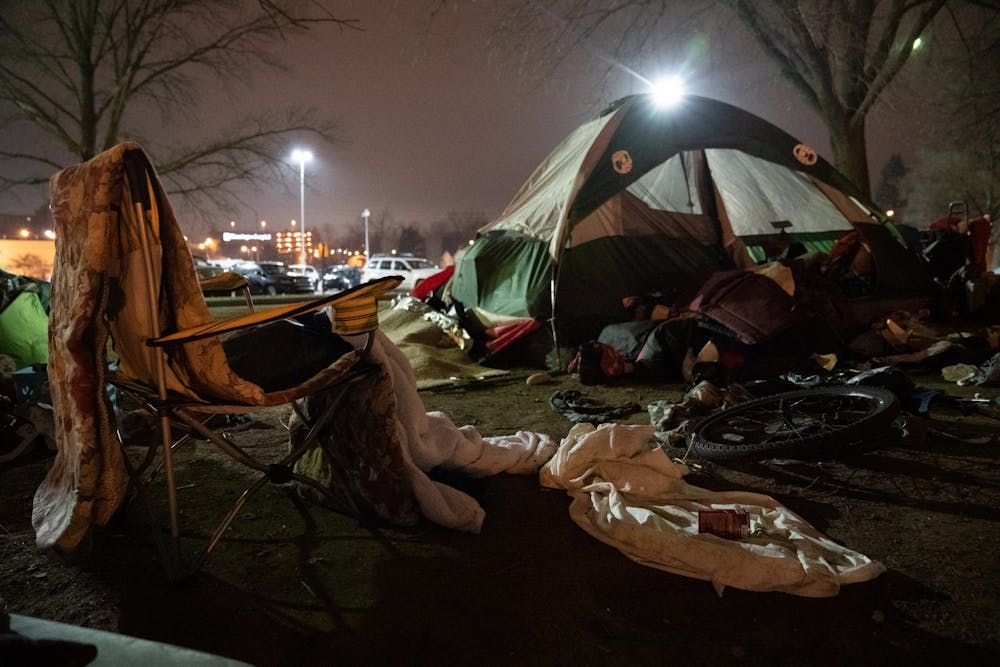The Greater Bloomington Chamber of Commerce announced Tuesday in a press release that based on overwhelming feedback from members, it opposes a proposed amendment to the Bloomington Municipal Code. The amendment would create several procedures the city would have to follow before evicting people experiencing homlessness from certain public spaces.
The proposed ordinance will be addressed at Wednesday night’s City Council meeting.
Related: [Bloomington City Council members drafting ordinance to better protect homeless camps]
The Chamber incorrectly stated that the ordinance “would allow encampments in public parks for extended periods.” The amendment does not have provisions that generally allow encampments for a longer period of time, though it does not allow the city to displace people experiencing homelessness if there are is no transitional or permanent housing available to them.
In the release, Chamber President and CEO Erin Predmore attributed the nonprofit membership organization’s stance to an interest in avoiding negative social and economic effects. Predmore called for a solution that supports people experiencing homelessness but “does not negatively impact local businesses, the jobs they provide, and the broader community.”
The release alleged that already-struggling businesses are facing added costs, including “security, cleanup of needles, bottles, feces, and other trash, and (in some cases) property damage" due to the encampments. It also claimed allowing encampments makes it less likely that other residents will be able to enjoy the city parks.
The release said more than 100 members of the Chamber, which has around 830 members, responded to a survey about the encampments, and more than 85% of respondents opposed the ordinance. A 26-page document of anonymous excerpts from the survey, including pieces of emails and transcriptions of phone interviews, is available on the Chamber’s website.
Responses to the survey were widely critical of the encampments in Bloomington parks, with several alleging people experiencing homlessness had damaged their property. A few responses pointed to the need to address the underlying problems that lead to homelessness, while many others expressed more hostile sentiments toward people experiencing homelessness.
When asked to suggest a solution, one respondent wrote, “Eliminate the nuisance!!”
Related: [Left in the cold: Members of Bloomington’s unhoused community describe hostility, danger]
Many anonymous respondents wrote that they and their customers feared the people staying in the camps for various reasons. Multiple responses of this variety generalized all of the people at the camps as being violent, addicted to drugs or dirty.
About 20% to 40% of people experiencing homelessness have substance abuse issues, according to a 2019 Q&A with New York University social work professor Deborah K. Padgett. She added that unhoused people are far more likely to be victims of violence than perpetrators.
“Many people who’ve contacted the Chamber are unwilling to speak publicly, for fear of reprisal from passionate advocates for the homeless,” the release read. “Their experiences are no less valid.”
One response to a survey question asking for suggestions of solutions to address homelessness in Bloomington stated, “Stop making Bloomington attractive to the homeless. Don’t give them a place to sleep in our parks. Move them out of town.”
Another called for funding to support temporary housing and health care, providing sanitation for the camps and listening to recommendations from experts.
The proposed amendment the Chamber opposes would create several procedures the city would have to follow before evicting people experiencing homlessness from certain public spaces. City councilmembers began drafting the ordinance after Bloomington Mayor John Hamilton had the Seminary Park homeless encampment dismantled in January.
Related: [City employees, Bloomington police dismantle Seminary Park homeless camp]
Due to the COVID-19 pandemic, the city had paused enforcement of an ordinance that requires anyone setting up tents in a public space between 11 p.m. and 5 a.m. to have a permit. But the rule has been enforced twice since early December, despite the ongoing pandemic.
The proposed amendment includes prohibiting displacing people experiencing homelessness from camps if sufficient housing isn’t available, requiring the city to store certain items belonging to anyone who is displaced and allowing the city to designate specific areas of public property where camps would be allowed and these new rules would apply.
In the press release, the Chamber said it supports the long-term work of various organizations that help address homelessness and that a collaborative, regional effort is needed to address the systemic issues underlying homelessness.
“We urge Bloomington City Councilmembers to reflect on these issues as they make policy decisions for the city,” Predmore said in the release. “We ask them to oppose Ordinance 21-06 and work to find viable solutions for our entire community.”
CLARIFICATION: This story has been updated to more clearly explain situations in which the ordinance would allow encampments to remain in public spaces.




